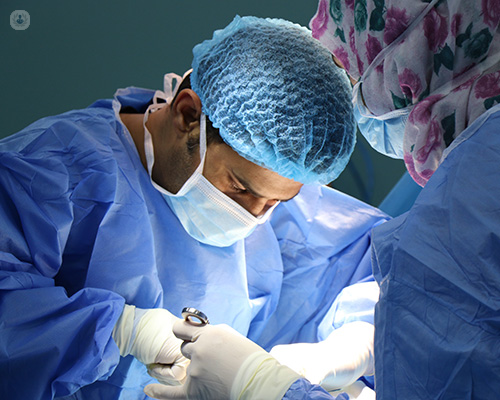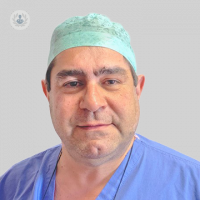What is a J-pouch?
Written by:There are certain unpleasant conditions that mean the large intestine (colon) has to be removed. In this case, your surgeon may offer J-pouch surgery. What is this procedure? Expert colorectal surgeon Mr Giovanni Tebala has the answers.

What is J-pouch surgery?
J-pouch surgery is one of the techniques to re-establish intestinal function after the excision of the whole large bowel. The treatment of some conditions, such as ulcerative colitis and familial polyposis of the colon, may entail the removal of the whole large bowel, from the caecum to the rectum. In this case, the intestine can be reconnected directly, by attaching the small bowel to a very short rectal stump or directly to the anus.
Unfortunately, this would result in the need to empty the bowel very frequently, sometimes 20 or 30 times a day. Obviously, this is not compatible with a good quality of life. Another option would be to create a J-shaped pouch with the small bowel before attaching it to the anus. This would reduce the number of bowel movements to a more sustainable 5-7 times per day (different case by case).
What does the procedure involve?
The operation can be done by open surgery or by laparoscopy and can be performed at the same time of the colectomy (excision of the large bowel) or at a later stage. After the removal of the large bowel, the last part of the small bowel is arranged into a J-shaped pouch (although some surgeons prefer a wider W-shaped pouch), which is sewn directly to the tail end or to a small stump of rectum.
To protect this suture and to allow it to heal completely, we usually fashion a temporary diverting ileostomy, which is meant to bring the faeces out in a bag before they reach the newly formed pouch. After a few weeks, the ileostomy can be closed and the continuity of the bowel will be restored.
How does having a J-pouch affect your diet?
There is no “right” or “wrong” diet for people with a J-pouch. It is important to have a balanced diet, with all the right nutriments, namely proteins, carbohydrates, lipids, vitamins, and electrolytes (salts). It is also important to have your meal in a relaxed and calm environment, to chew your food completely, and to allow time to digest before going back to work or any other activity.
Clearly, the absence of the large bowel and the direct join of the small bowel – with or without a pouch – to the anus will change your bowel habits and you may expect to pass loose stools several times a day. Living with a J-pouch is about learning to cope with the frequency of motions. Foods like chocolate, coffee, spicy food, nuts, alcohol, dairy products, beans, peas, cauliflower, broccoli, sprouts, and lentils can increase the frequency of stools and make them watery. You may wish to avoid them. Conversely, rice, pasta, pizza, and bread can reduce the frequency of motions and make the stools more solid. Spicy food, nuts and fruit juices should be avoided also because they can produce a burning feeling around the anus.
How to empty a J-pouch
Initially, when the stools are very watery, you may not feel the need to empty the pouch, or you may just feel some “pressure” in the pelvis, and may have some episodes of leakage or urgency. After a few weeks, as soon as the pouch dilates, the sphincters regain their tone and the stools become thicker, and you may get a more familiar feeling of fullness in your back passage and will be able to control your motion much better. Initially, the pouch will not empty completely and you will learn how to improve the emptying by squeezing your pelvic and abdominal muscles and by moving up and down on the toilet.
Visit Mr Tebala’s Top Doctors profile to book an appointment or for more information.


